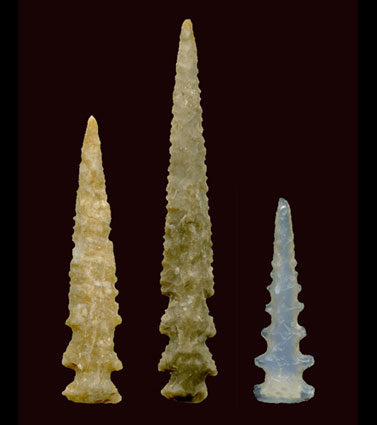

Company Mission & Values
Client service in an open, team-based environment is our hallmark at Desert Archaeology. We take pride in serving the interests of our clients while preserving cultural resource values, and have built a record of successful partnerships with professional, nonprofit, governmental, and academic entities.

Company Mission & Values
Client service in an open, team-based environment is our hallmark at Desert Archaeology. We take pride in serving the interests of our clients while preserving cultural resource values.
We serve a diverse set of clients, from government agencies to private firms. With more than 30 years of experience, the company has developed strong working relationships with federal, state, and local regulatory agencies, as well as a fundamental understanding of the cultural resources of the U.S. Southwest. This translates into highly efficient assessments of project effects and innovative solutions to regulatory compliance.
As a small business, we invest in the communities where we work. When our clients look toward future improvements, we work to find and share the compelling histories that make each place unique. When possible, we hire locally and buy locally.
Our staff members work closely with academic colleagues at the University of Arizona School of Anthropology, Arizona State Museum, Pima Community College, Arizona State University, and Northern Arizona University, providing guest lectures, training opportunities, and occasional internships to undergraduate and graduate students.
Our commitment to education and outreach also means that many of our employees volunteer with archaeological nonprofits around the Greater Southwest as speakers, teachers, and members and officers on boards of directors.
Our Origin Story
In 1989, two companies emerged from the original nonprofit Institute of American Research. Desert Archaeology assumed cultural resources management work, while Archaeology Southwest was established as a nonprofit. The two entities are independent organizations.
William H. Doelle, Ph.D., founded the company in 1982 as the Arizona Division of the California-based Institute of American Research. Desert Archaeology, Inc., was established as an independent entity in 1989, and transitioned to being a woman-owned company in January 2017, when Dr. Sarah Herr became owner and president.
Desert Archaeology has expanded from its base in Tucson to include the Greater Southwest region. In 1999, we opened a branch office in Phoenix to more effectively serve our clients in that area.
The company has successfully completed more than 2,400 projects in the Greater Southwest, ranging from small surveys to large excavations, and extending throughout the state of Arizona and into New Mexico and eastern California. We creatively integrate scientific research, public outreach, and legal compliance, and have established a record of work that is timely, cost effective, and of the highest professional quality.
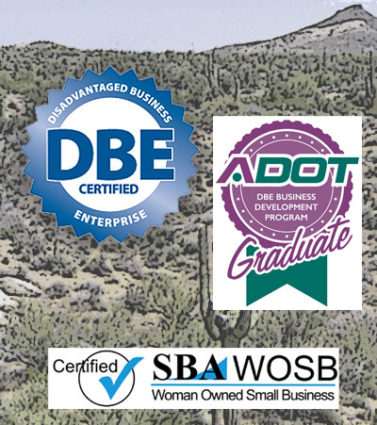
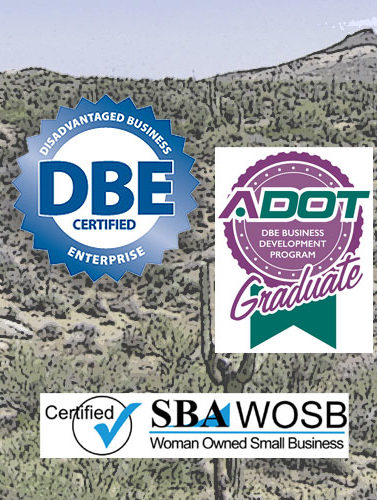
Certifications
Desert Archaeology is certified as both a Woman-Owned Small Business (nationwide) and a Disadvantaged Business Enterprise (Arizona, New Mexico, California), and holds a GSA contract.

Certifications
Desert Archaeology is certified as both a Woman-Owned Small Business (nationwide) and a Disadvantaged Business Enterprise (Arizona, New Mexico, California), and holds a GSA contract.
As a certified Woman-Owned Small Business (WOSB), we can help your project meet federal contracting goals for use of small business set-asides. We can also help meet state and federal transportation project goals for the use of Disadvantaged Business Enterprise (DBEs), as we are registered in both Arizona and New Mexico, and have completed the ADOT DBE Business Development Program.
Federal clients can find us on the GSA schedule (GS-10F-161AA), a contract we have held since 2013.
We are a charter member of the American Cultural Resources Association, the trade organization for the cultural resources management industry in the United States.
Desert Archaeology is a partner in the Coalition for Archaeological Synthesis. The Coalition promotes and funds collaborative synthetic research that seeks to understand the past in ways that contribute solutions to contemporary problems. Our partnership reflects our goal of encouraging our staff to develop innovative, efficient analytical and interpretive techniques and to collaborate with outside researchers to produce the best science possible from CRM excavations. In this way, we maximize the research potential of data collected by member organizations for the benefit of the people and communities that have supported archaeological research.
Desert Archaeology Principal Investigators Sarah Herr (president and Tucson office) and Kathy Henderson (Phoenix office) are listed in the Register of Professional Archaeologists, whose members agree to abide by an explicit code of conduct and standards of research performance.
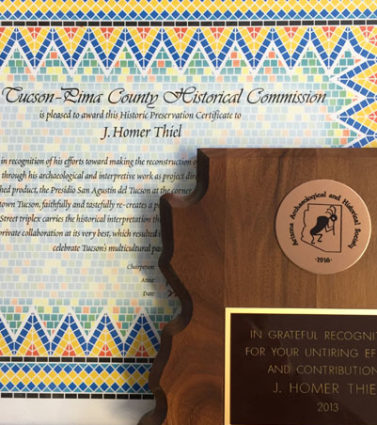
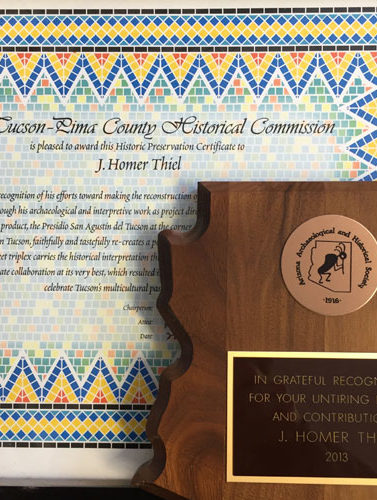
Recognition
Our work as a firm and as individual researchers has garnered recognition from a variety of local, state, national, and international entities. Read more to see selected awards and honors.

Recognition
Our work as a firm and as individual researchers has garnered recognition from a variety of local, state, national, and international entities. Selected awards and honors are listed below.
Governor’s Archaeological Advisory Awards in Public Archaeology, For-Profit Corporation (2020). Desert’s social media platforms were honored for contributions in public outreach, focusing on the Field Journal. The Field Journal regularly posts content distilled from Desert’s archival and ongoing work, written to engage the general public. It has recently become a valuable online teaching resource for secondary and post-secondary educators.
Pima County Featured Video: Archaeological Remediation for the January 8 Memorial (2020):
Feature article, Forbes Magazine (2018). Desert Archaeology’s work at Sky Harbor Airport for the City of Phoenix, and project director Kathy Henderson’s subsequent collaborative research, was featured in an article about Hohokam responses to flood-damaged infrastructure and its impacts on social structures.
Victor Stoner Award, Arizona Archaeological and Historical Society: Homer Thiel (2017). Homer was recognized for his decades of work in public outreach and education, particularly in the sphere of historical archaeology in Tucson.
Society for American Archaeology Presidential Recognition Award: Task Force on Regional Planning, with William Doelle (2017). Bill chaired a task force that articulated productive strategies for incorporating archaeological sites and regions into landscape-scale development planning. Their insights and recommendations were crystallized in a May 2016 report in Advances in Archaeological Practice, some of which are already incorporated into federal planning documents.
Society for American Archaeology Presidential Recognition Award: Task Force on Gender Disparities in Archaeological Grant Submissions, with Sarah Herr (2017). Sarah was part of a task force that systematically investigated why women’s National Science Foundation (NSF) grant applications were strikingly lower than those of men’s over several years. Their NSF-funded, task force–based statistical and survey research produced a report with thought-provoking and very useful findings and recommendations.
Society of Historical Archaeology: Gender and Minority Affairs Committee Diversity Field School Award: University of Arizona Guevavi Field School, co-directed by J. Homer Thiel (2017). Homer teamed with U of A and National Park Service personnel to run a multi-season field school for undergraduates, working on the Spanish Mission Los Santos Angeles de Guevavi.
Shanghai Archaeology Forum Research Award: The Earliest Farmers In The Southwest: William H. Doelle, James M. Vint, Sarah A. Herr (2015). Decades of research conducted by Desert Archaeology was the basis for this award.
University of Arizona School of Anthropology Raymond H. Thompson Award: William H. Doelle (2015). Bill was recognized for his unique contributions to anthropology at the University of Arizona.
Governor’s Archaeology Advisory Commission in Public Archaeology: City of Phoenix Aviation Department Community Noise Reduction Program (2014). This award recognized Desert Archaeology’s Seeds of Growth public-oriented report for the City of Phoenix Community Noise Reduction Program, following field work directed by Kathy Henderson.
Arizona Museum of Natural History Leaders of the Field in Hohokam Research Today: William H. Doelle, T. Kathleen Henderson, David A. Gregory (2013). Two of our principal investigators, along with late project director Dave Gregory, were recognized as being among the top researchers in Hohokam archaeology.
Arizona Archaeological and Historical Society Appreciation Award: J. Homer Thiel (2013). Homer was recognized for his untiring efforts and contributions to archaeology and history in Arizona.
Society for American Archaeology Award For Excellence in Cultural Resource Management: Henry D. Wallace (2013). Henry was recognized for his contributions to rock art chronology in southern Arizona, Hohokam ceramic chronology, and the understanding of Hohokam village formation and structure.
Arizona Archaeological and Historical Society Appreciation Award: Emilee Mead (2011). Emilee is Desert Archaeology’s publications manager and head editor. She was recognized for her work editing and designing Glyphs, AAHS’ monthly newsletter.
Society for American Archaeology Award for Excellence in Cultural Resource Management: William H. Doelle (2010). Bill was recognized for his extraordinary achievements in applied archaeology.
Archaeology Magazine Top Ten Discoveries of 2009 (2010). Desert Archaeology’s work on early agriculturalists at the site of Las Capas in Tucson was named one of the top 10 archaeological discoveries worldwide.
Arizona Archaeological Council Award of Appreciation: James M. Heidke (2009) . Jim was recognized for developing ceramic sourcing methods that have enriched our understanding of prehistoric ceramic production, distribution, and specialization.
Society for Historical Archaeology Award of Merit: The City of Tucson, Arizona for the Rio Nuevo Project: William H. Doelle (2008). Desert Archaeology was recognized for the extensive public outreach programs and outstanding historical archaeological work at the Presidio del San Agustín and the San Agustín Mission.
Tucson-Pima County Historical Commission Historic Preservation Certificate: J. Homer Thiel (2008). Homer was recognized for his efforts toward making the reconstruction of the Presidio San Agustín a reality through his archaeological and interpretive work as a Desert Archaeology project director.
Governor’s Archaeology Advisory Commission Professional Archaeologist Award: William H. Doelle (2007)
Governor’s Heritage Preservation Honor Awards Grand Award Winner: Rio Nuevo Archaeology and Historic Research Public Outreach: Desert Archaeology, Inc., the Center for Desert Archaeology (now Archaeology Southwest), the Arizona State Museum, and the Arizona Historical Society (2005). The five-year Rio Nuevo project sponsored by the City of Tucson culminated in this award to Desert Archaeology and its partners.

